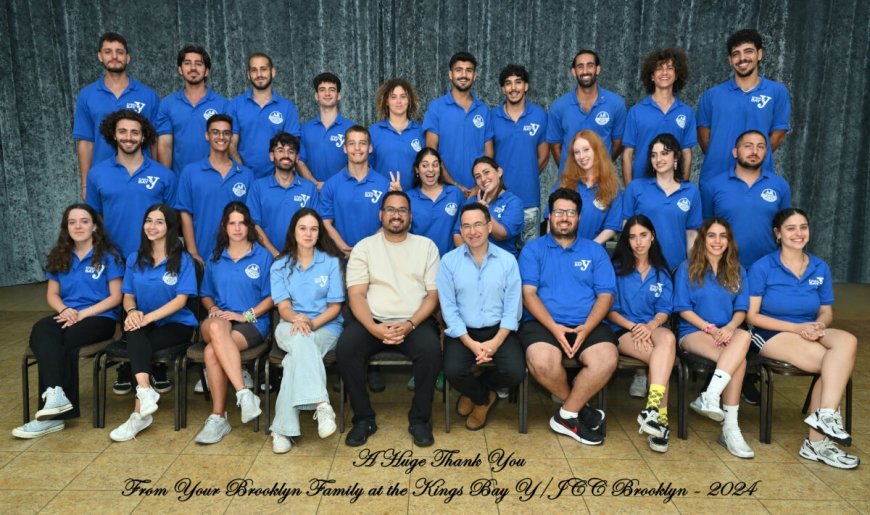Bringing Israel’s story to American Jewish day camps
A rabbinic colleague recently shared an insightful observation: “I was raised with a deep love for Israel, but I’ve come to realize that my child’s connection will likely be more about loving Israelis.” While sending young Israeli emissaries (shlichim) to Jewish overnight camps in the U.S. has been a cornerstone of Zionist education in America,... Read More

 A rabbinic colleague recently shared an insightful observation: “I was raised with a deep love for Israel, but I’ve come to realize that my child’s connection will likely be more about loving Israelis.”
A rabbinic colleague recently shared an insightful observation: “I was raised with a deep love for Israel, but I’ve come to realize that my child’s connection will likely be more about loving Israelis.” While sending young Israeli emissaries (shlichim) to Jewish overnight camps in the U.S. has been a cornerstone of Zionist education in America, this practice has seldom extended to Jewish day camps in a substantial manner. Given that non-Orthodox Jewish children predominantly attend day camps in lieu of Jewish overnight camps, the question arises: How can we infuse the experience of Israel into the lives of these campers and their counselors?
This summer, we welcomed 26 remarkable young post-army Israelis to our Kings Bay Y and JCC Brooklyn day camps through the Jewish Agency for Israels Summer Camp Shlichim program. The immersive experience of interacting with these young Israelis — through dance, music, activities, sports and arts — imparted more about Israel than any formal educational setting could achieve; and witnessing the children develop genuine affection for Israelis in an organic and unforced manner was profoundly moving.
 A commemorative photo from this summer. Courtesy/JCC Brooklyn
Each morning, a throng of children rushed toward our Israelis, captivated by their presence and eager to emulate them. (By the end of the summer, the children knew Israeli performer Noa Kirel’s songs, even if they didnt understand the lyrics.) The yellow ribbons worn by every Israeli provoked numerous inquiries, prompting our shlichim to explain their significance. During our camp-wide Israeli Day, the shlichim shared their personal stories and the rich mosaic of Israeli culture with the children, showcasing its Moroccan, Yemenite, Polish, Russian, Tunisian and Iraqi influences. Their cooking classes offered a tangible taste of Israel, while simple Hebrew words and chocolate drinks provided further immersion. And on Tisha B’Av, hundreds of children placed their heartfelt messages on the symbolic Western Wall, expressing their profound hopes for an end to conflict, the release of hostages and the safety of Israeli soldiers.
A commemorative photo from this summer. Courtesy/JCC Brooklyn
Each morning, a throng of children rushed toward our Israelis, captivated by their presence and eager to emulate them. (By the end of the summer, the children knew Israeli performer Noa Kirel’s songs, even if they didnt understand the lyrics.) The yellow ribbons worn by every Israeli provoked numerous inquiries, prompting our shlichim to explain their significance. During our camp-wide Israeli Day, the shlichim shared their personal stories and the rich mosaic of Israeli culture with the children, showcasing its Moroccan, Yemenite, Polish, Russian, Tunisian and Iraqi influences. Their cooking classes offered a tangible taste of Israel, while simple Hebrew words and chocolate drinks provided further immersion. And on Tisha B’Av, hundreds of children placed their heartfelt messages on the symbolic Western Wall, expressing their profound hopes for an end to conflict, the release of hostages and the safety of Israeli soldiers.Through daily activities, these emissaries brought a piece of Israel and a sense of connection to Jewish peoplehood to children who otherwise might not encounter it. They enriched the lives of 1,400 children this summer, and the impact of their engagement with American children and counselors in the U.S. was deeply significant for them as well.
The shlichim shared with us that their experiences in the United States will remain with them as they address comments and questions from friends and family such as, “I thought Brooklyn was only for religious people!” Daniella, for instance, now finds resonance in the lyrics of Ehud Banai’s song about Brooklyn: “Brooklyn nigleh, Brooklyn nistar / Ani lo mikan aval lo mamash zar” (“Brooklyn revealed, Brooklyn hidden / I’m not from here, but not entirely a stranger.”) Coordinating their Airbnb accommodations, ensuring their safety and managing the occasional hostility they faced in Brooklyn bars is no small task; yet, the effort was profoundly worthwhile.
As a father of an American lone soldier in an IDF combat unit, I thought I had a firm grasp on the realities these young Israelis face. However, I was taken aback on July Fourth to find “our Israelis” huddled together in a JCC space, seeking comfort from the seemingly innocuous fireworks of Brooklyn’s Independence Day celebrations. The sounds, reminiscent of their recent traumatic experiences, were a stark reminder of the ongoing reality in Israel: Omer carries the memory of his close friend Evyatar, lost in the tragic events of Oct. 7. Eitans family, their home in Northern Israel destroyed by Hezbollah, remain displaced and have endured ongoing hardship since October. Yossi traveled from Colombia to join his reserve unit in Gaza when the war started, and he was diagnosed with PTSD after three months of intense service.
They carried their stories into our camps and communities, and we were fortunate to offer them a space to express themselves. They fulfilled a special reserve duty: teaching our children to cherish and love Israelis.
Leonard Petlakh is the CEO of the Kings Bay Y and JCC Brooklyn in New York City.
What's Your Reaction?




















